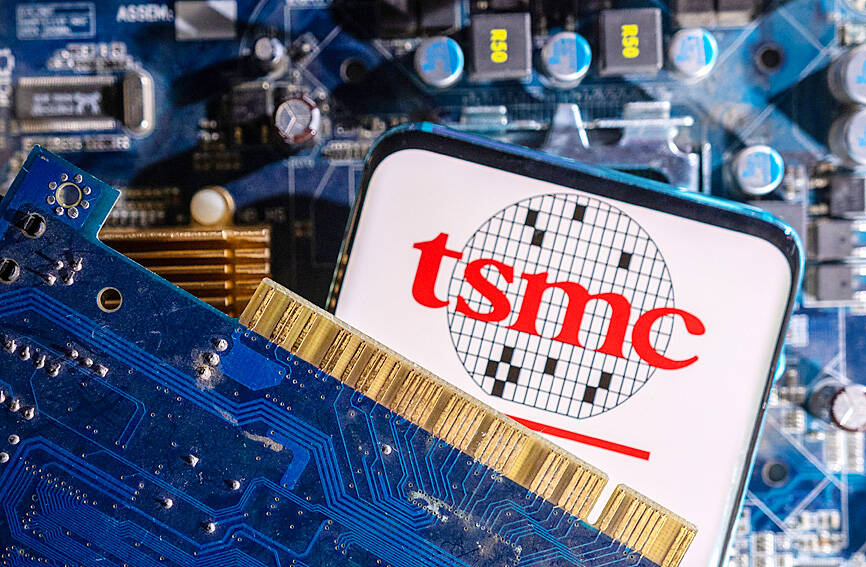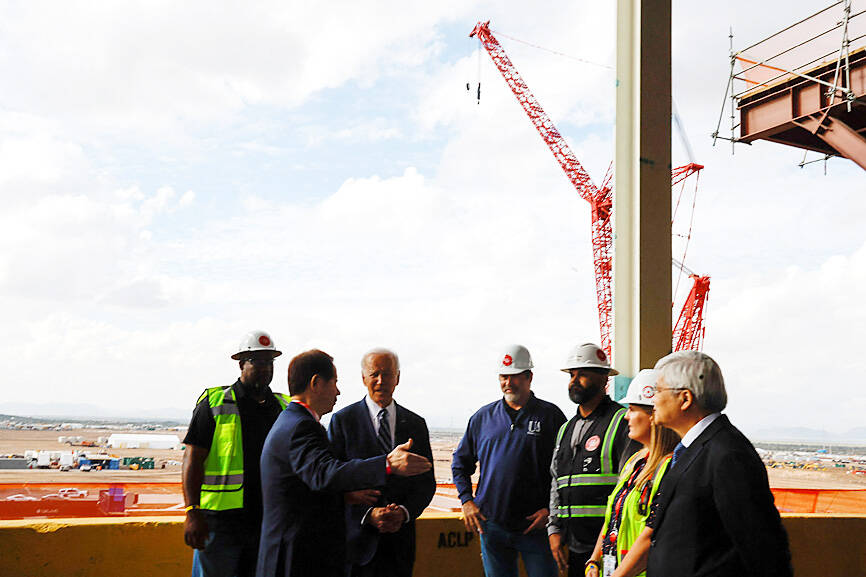Taiwan Semiconductor Manufacturing Co (TSMC, 台積電) is studying the feasibility of a fab in Europe, the chipmaker said in response to a Taiwanese media report stating that it is planning to build a plant in Dresden, Germany.
The Chinese-language Commercial Times reported yesterday that the company has chosen the German semiconductor hub of Dresden for a fab, with production slated to start in 2025.
The report said the investment in Germany would meet strong European demand for TSMC’s specialty processes and mitigate potential geopolitical barriers.

Photo: Reuters
Citing sources from within TSMC’s supply chain, the report said the proposed fab would make use of Dresden’s comprehensive semiconductor ecosystem and better serve its EU clients.
Major international semiconductor firms including Infineon Technologies AG, Robert Bosch GmbH, GlobalFoundries Inc, X-Fab Silicon Foundries SE and NXP Semiconductors NV have run fabs in Dresden, while semiconductor equipment suppliers, including Applied Materials Inc, ASML Holding NV and Siltronic AG have also established production bases in the city.
TSMC is building fabs in Arizona to manufacture chips using 4-nanometer (nm) and 3nm processes, with mass production scheduled to begin next year.

Photo: Reuters
It is also building a plant in Japan that is to use the company’s 12nm, 16nm and 22nm processes, as well as 28nm specialty technology, with commercial production expected to start next year.
TSMC last week said it considers clients’ needs and available government support when choosing locations for new ventures.
It is considering building a fab in Germany to develop chips used in automotive electronics and specialty processes, TSMC said, adding that a second fab in Japan is also being discussed.
The company is assessing plans for a German plant and no decision has been made, TSMC spokeswoman Nina Kao (高孟華) said.
However, an editorial published yesterday by Taiwan’s Central News Agency (CNA) said that the EU should not get a Taiwanese semiconductor plant if the European Commission does not engage in trade talks with Taipei.
The EU seeks chip investments to safeguard its supply chain, but without help from the likes of TSMC and Intel Corp, the EU could find it difficult to secure advanced chipmaking capabilities, the editorial said.
“The EU wants Taiwan to set up chip plants, but for Taiwan there is no need to do so from a corporate perspective,” CNA wrote. “If the EU only wants chips from Taiwan but shies away from talking diplomacy, will Taiwan, with its global strategic assets, be this naive?”
Tensions between Beijing and Taipei have escalated as the US asserts its power to counter China’s influence in the region.
Taiwan’s dominant role in the global market for advanced chips is boosting its strategic position, while the country has been aggressively seeking to deepen trade and other relations with the West.
The CNA editorial also criticized an EU official for saying that the 27-member bloc did not need a bilateral investment agreement with Taiwan.
European External Action Service Asia Pacific managing director Gunnar Wiegand on Wednesday last week said that stable conditions and a well-functioning legal system in Taiwan meant it was “rational” for the EU not to seek such an agreement.

Intel Corp chief executive officer Lip-Bu Tan (陳立武) is expected to meet with Taiwanese suppliers next month in conjunction with the opening of the Computex Taipei trade show, supply chain sources said on Monday. The visit, the first for Tan to Taiwan since assuming his new post last month, would be aimed at enhancing Intel’s ties with suppliers in Taiwan as he attempts to help turn around the struggling US chipmaker, the sources said. Tan is to hold a banquet to celebrate Intel’s 40-year presence in Taiwan before Computex opens on May 20 and invite dozens of Taiwanese suppliers to exchange views

Application-specific integrated circuit designer Faraday Technology Corp (智原) yesterday said that although revenue this quarter would decline 30 percent from last quarter, it retained its full-year forecast of revenue growth of 100 percent. The company attributed the quarterly drop to a slowdown in customers’ production of chips using Faraday’s advanced packaging technology. The company is still confident about its revenue growth this year, given its strong “design-win” — or the projects it won to help customers design their chips, Faraday president Steve Wang (王國雍) told an online earnings conference. “The design-win this year is better than we expected. We believe we will win

Chizuko Kimura has become the first female sushi chef in the world to win a Michelin star, fulfilling a promise she made to her dying husband to continue his legacy. The 54-year-old Japanese chef regained the Michelin star her late husband, Shunei Kimura, won three years ago for their Sushi Shunei restaurant in Paris. For Shunei Kimura, the star was a dream come true. However, the joy was short-lived. He died from cancer just three months later in June 2022. He was 65. The following year, the restaurant in the heart of Montmartre lost its star rating. Chizuko Kimura insisted that the new star is still down

While China’s leaders use their economic and political might to fight US President Donald Trump’s trade war “to the end,” its army of social media soldiers are embarking on a more humorous campaign online. Trump’s tariff blitz has seen Washington and Beijing impose eye-watering duties on imports from the other, fanning a standoff between the economic superpowers that has sparked global recession fears and sent markets into a tailspin. Trump says his policy is a response to years of being “ripped off” by other countries and aims to bring manufacturing to the US, forcing companies to employ US workers. However, China’s online warriors